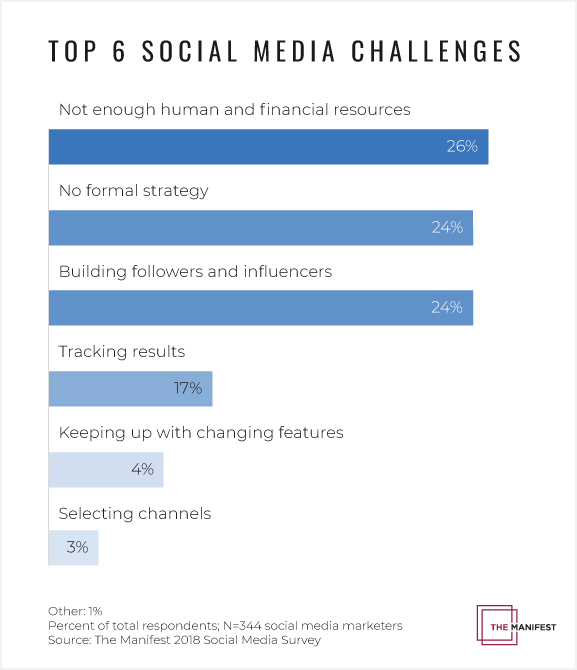There are more than 2.5 billion social media users from around the world, a number that is continuously growing.
If businesses want to reach the most potential customers possible, they should be on social media. Despite its necessity, however, social media still has its challenges, especially for small businesses.
According to a recent survey from The Manifest, the top six social media challenges are:
- Not having enough human and financial resources (26 percent)
- Lacking a formal strategy (24 percent)
- Building a community of followers (24 percent)
- Tracking results (17 percent)
- Keeping up with changing features (4 percent)
- Selecting channels (3 percent)
Not Enough Resources
More than one-fourth of businesses say not having enough financial and human resources is their biggest struggle with social media.
This especially makes sense for small companies, whose employees already wear many hats. When your employees are already balancing multiple tasks, who has time for social media? This, however, is an incorrect assumption – a company should do everything in its power to be on social media.
If one person doesn’t have time to take charge of social media, make it a group effort – one employee can be in charge of Facebook, one in charge of Twitter, one in charge of LinkedIn, etc. This will allow a company to spread out its social media duties; no single employee will be forced to do all the social media. It will, instead, be multiple people in charge.
If your company doesn’t have the human power to do social media in-house, many partner with influencers, who can help promote their products and brand affordably – some companies pay influencers, while others just offer free products in exchange for promotion.
Lack of a Formal Social Media Strategy
The second-highest social media challenge is lacking a formal strategy.
Companies don’t need a pages-long manual for social media; a simple, consistent strategy can work too.
If your company doesn’t have the manpower to post on every social media platform, just choose the ones that make the most sense for your business.
For example, if your company targets baby boomers, it would not make sense to have an Instagram account. With just 18 percent of people ages 50 to 64 on Instagram, your posts would not have a big audience and therefore, not a big following.
If your company targets millennials, however, it makes sense to use Instagram because 59 percent of people ages 18 to 29 use this social network.
The platforms you use all depend on your target audience. For the platforms you decide to use, it’s essential to understand that how you use each one and how often you post varies by platform.
For example, if your company has both Twitter and LinkedIn accounts, you should post on Twitter much more often than LinkedIn, and your LinkedIn posts should be significantly longer than Twitter’s 280-character limit.
Building Followers
Tied with lacking a strategy, the second-biggest challenge businesses face with social media is building a follower base.
Although most businesses are likely to attempt to build followers online, building followers in-person also works, especially for companies that frequent events and conferences.
If your company is at an event or somewhere else where it hands out paper materials, include your social media handles. You can also mention your social media accounts in a conversation. This can help build a community of followers.
You can also test different content for effectiveness. If content such as polls or images you post gets shared and engaged with more than other types of content, try to post them more often. The more your post is shared, the more followers you are likely to gain.
The fourth-biggest social media challenges for businesses is tracking results. Tracking results on social media is difficult because it’s hard to track the buyer’s journey from social media to purchase.
People who like your social media pages may not necessarily be customers, and customers may not necessarily like your social media pages.
The success of social media will not be immediate and obvious. This does not change the fact that social media is essential. Posting on social media may not result in an immediate conversion, but potential customers take notice of your posts and may eventually convert.
If you decide to track metrics, track only the ones that matter most to your company. If you value engagement most, track that first. Once you get used to tracking one or two metrics, you can begin tracking more.
Whatever social media challenges your company faces, with a little time and effort, they are easier to overcome. Social media is not easy, but it is necessary.







